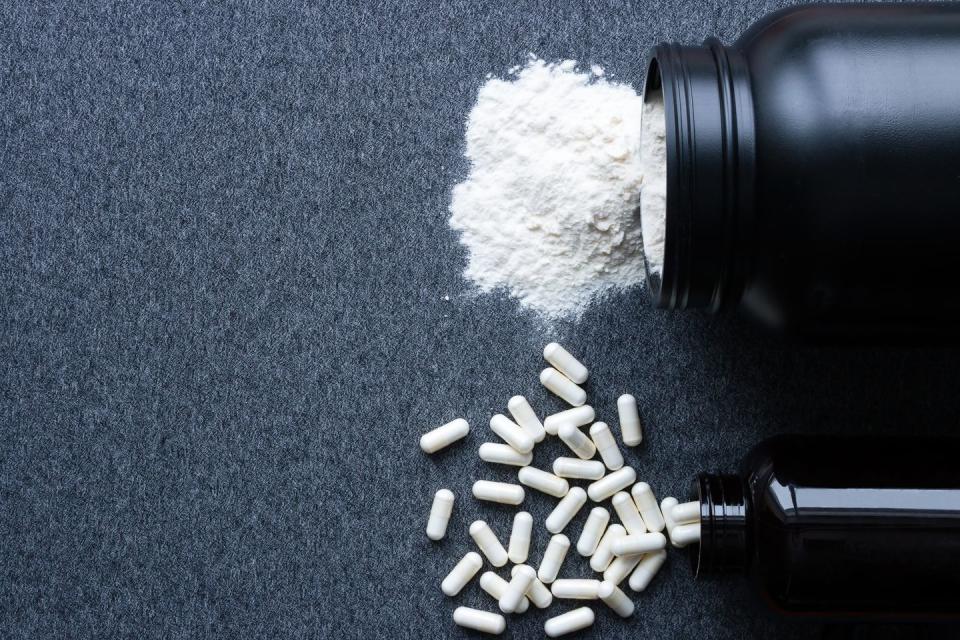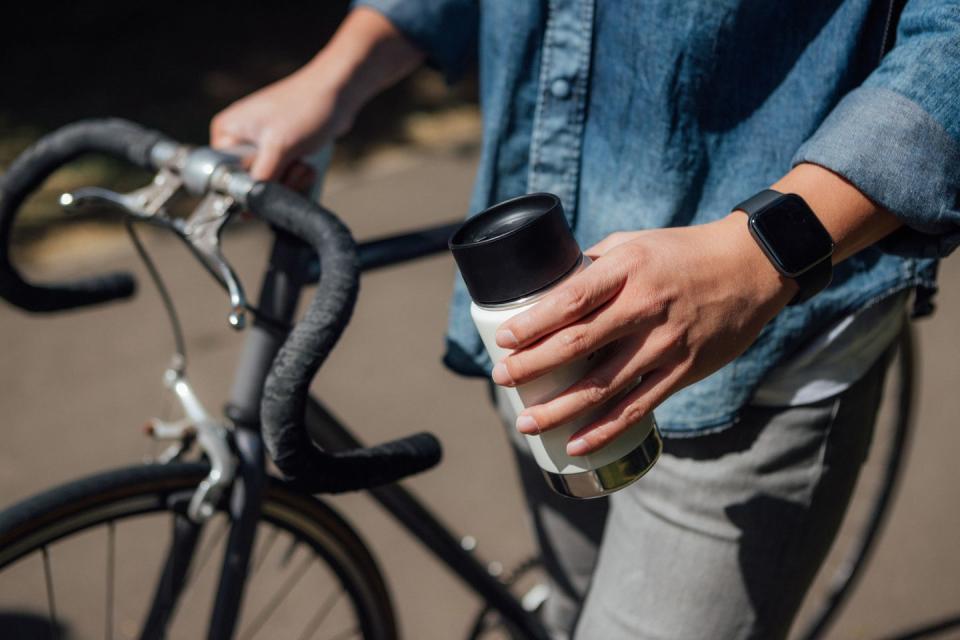What Every Guy Should Know About Pre-Workout Supplements

You can't expect to turn up to every workout feeling 100%. Sometimes, you'll go to the gym feeling tired, lethargic and unmotivated, and if that sounds familiar, finding the best pre-workout supplement may be all that's needed to get you out of your training lull.
Don't believe in the power of pre-workout? Well, a study published in the Journal of the International Society of Sports Nutrition reported that combining pre-workout with HIIT sessions resulted in significant increases in VO2 max, training volume and lean body mass, while also speeding up the rate at which moderately trained recreational athletes lost body fat.
Read more supplement reviews from Men's Health
Still, if you decide to get in on the pre-workout action yourself, you'll want to know how to do it safely and smartly. That's why we've created a one-stop guide, which includes insight from a professional sports nutritionist, as well as pros and cons of supplementing your nutrition with every lifter's favourite pick-me-up.
You'll also find a guide to the products that can give you a natural pre-workout boost, plus the best pre-workout supplements money can buy, as tested by Men’s Health. Consider this article your pre pre-workout.
The Best Pre-Workout Supplements
What Does Pre-Workout Do?
If you don't fuel yourself properly before exercises or hard workouts, you'll be less energised, weaker and will tire faster than normal. That's a fact. Pre-workout is designed to help fight this and keep you going harder, for longer. While the supplement can be taken in a variety of formats — from meals to shakes to pills and more — they're all designed to boost energy levels and increase focus.
For many, pre-workout supplements are usually mixed with a drink and taken around 30 minutes before the beginning of a workout. By giving your body extra carbohydrates, it helps raise blood sugar levels and supply additional energy during exercise. In short, they're much more energising than a banana or a black coffee.
What's In Pre-Workout
As a pre-workout is designed to help you cruise through a particularly tough workout, it shouldn't be a surprise to learn that they supply your system with sugar, caffeine and other energy-boosting stimulants.
And it pays to read the ingredients label before you invest in a fresh pot of pre-workout. Caffeine is the key ingredient to look out for as the content can vary from mild to way too much, and in extreme cases, high levels of caffeine can cause some pretty serious health issues such as anxiety, insomnia and high blood pressure.

For most men, pre-workout is a safe supplement to take, but even at the safe end of the spectrum, its side effects can still cause jitters, itching and interrupted sleep, which are harmless but still uncomfortable. Our advice: if you're new to pre-workout, go for half doses to begin with and see how your body reacts.
Pre-Workout Ingredients To Look Out For
Creatine Monohydrate: A popular supplement among gym-goers, creatine is included in many pre-workouts due to its potential to increase muscle power and performance during training.
BCAAs: Branch chain amino acids have been found to improve endurance during a workout and increase strength by maintaining cellular energy and supporting protein synthesis.
Taurine: Found in various animal meats, taurine is a sulfonic acid that contributes to the metabolism of fats and fights oxidative stress during workouts.
B-vitamins: Vitamins B1, B2 B5, and B6 all play important roles in energy production and efficiency, while vitamin B12 supports blood production and vitamin B3 boosts DNA repair and promotes healthier skin.
NO2-boosters (ex. Arginine, Citrulline): Arginine, for example, is a nitrogen dioxide booster and an amino acid that acts as a 'vasodilator'. Essentially, arginine (and other similar nitrogen dioxide supplements) expands your veins and arteries, making it easier for blood to flow around your body, delivering nutrients quicker and more efficiently.
Pre-Workout Ingredients To Avoid
Research published in Food and Chemical Toxicology cited that 400mg of caffeine a day is the upper limit for adults. What does this mean to you? One cup of instant coffee contains 60-80mg of caffeine, but high street flat whites contain anything between 65mg at Pret A Manger and 160mg at Starbucks.
Some pre-workout brands spill over the recommended daily dose. ProSupps Mr Hyde NitroX pre-workout, for example, houses an uncomfortable 410mg of caffeine in a 7.5g scoop.
As sports nutritionist Matt Lovell points out, there are definitely some pre-workout products you should actively avoid. 'I would say any speed cousins, amphetamine cousins. Some pre-workouts basically contain ecstasy. Or close to it,’ he says.
Is Pre-Workout Dangerous?
Broadly speaking, pre-workout supplements — such as the products we've listed below — are safe to take on a regular basis when following the manufacturer's instructions. Of course, when it comes to ingesting caffeine, we all have different thresholds and with some brands tipping over a sensible limit of caffeine content, it can become a risky game.
Bear in mind that figure from the Food and Chemical Toxicology journal: 400mg a day – that's around two to three cups of coffee — is the upper limit for adults, so be sure to check the per-serving caffeine content of your supplement during your next top-up.

How Long Pre-Workout Takes To Kick In
When you start exercising, you want to hit the ground running. You don't want to be waiting around for your pre-workout to kick in, so it's important to find the sweet spot. For most people, the ideal time is around 30 minutes to one hour before your workout — this should give the supplement enough time to hit your bloodstream and amp you up ahead of your session.
Something to consider, however, is the 'half life' of caffeine. Generally, caffeine has a half-life of around three to seven hours after ingestion. If you're used to training in the evenings, you want to take half the recommended dose or swap it out for a pre-workout alternative.
When To Take Pre-Workout
Like we've mentioned above, most people take pre-workout around 30 minutes to one hour before they work out, but just because it's called pre-workout that doesn't necessarily mean you have to take it prior to your workout. 'For longer sessions, you could delay until an hour into the session,' suggests Lovell. Always refer to the label of your pre-workout for specifics.
Should You Take Pre-Workout Every Day?
If you continue to take pre-workout on a regular basis, your body can build up a tolerance to its effects, which is why Lovell advises cycling the supplement, or coming off it for six to eight weeks at a time to give your body a chance to reset. 'Cycling is the way forwards,' he says. ‘Also get some stimulant-free ones [that] you can use most days or just some plain old tyrosine, which is a very good budget pre-workout.'

Can You Use Coffee as a Pre-Workout?
As we've mentioned, coffee and pre-workout share a common primary ingredient: caffeine. Found to have an effect on improving athletic performance, coffee also doesn't contain the additives and additional ingredients that other pre-workout supplements may have. Studies have shown that caffeine concentration peaks at about 45 minutes after ingestion, with effects lessening thereafter.
Simply put — yes, you can use coffee as a pre-workout.
The Pros and Cons of Taking Pre-Workout
Pros
Improved performance: Research published in the Journal of the International Society of Sports Nutrition concluded that pre-workout supplements 'have promise as an ergogenic aid for active individuals.' Or, in other words, they enhance the performance of people who already exhaust the gym.
Increased concentration and focus: Pre-workout is packed with caffeine, which is know to enhance cognition. As research published in the Journal of Alzheimer's Disease found, caffeine works to boost people's arousal, mood and concentration, so if you want to be focused on a workout, pre-workout is the supp for you.
The University of Córdoba found the citrulline added to pre-workout could add up to 53% more bench press reps in a workout.
In another study, pre-workout containing citrulline was found to give cyclists a 12% longer ride before hitting exhaustion.
Cons
Negative side effects caused by overstimulation: if the jitters and interrupted sleep we mentioned earlier don't sound like fun, perhaps give pre-workout a miss.
You can build up a tolerance with overuse: if taken excessively, your body can become immune to pre-workout's effects. To avoid this, it's probably best to save pre-workout for those sessions where it's 'go hard or go home' or try cycling the supplement once in a while.
It can cause digestion problems: ingredients such as sodium bicarbonate, magnesium, creatine and caffeine can all cause digestion problems. Avoid this by trying different pre-workout supplements until you find one that works for you.
Scientists have previously linked the original class of energy drinks to diabetes, mental health problems and kidney damage.
How We Test Pre Workout
To help you find the best pre-workout supplements — whether you’re looking for a powerful energy kick or a gentle caffeine-free boost — we enlisted a panel of sports nutritionists to put a range of market-leading products to the test as part of our 2024 Men's Health Sports Nutrition Awards.
They assessed each pre-workout based on the quality of ingredients, nutritional make-up and formulation. Judging was extremely stringent and only the ones that really impressed were put forward for further testing in the Men's Health Lab.
Our panel of fitness fanatics, editors and food testers then rated each pre-workout on flavour, texture, aroma and ease of use. We also tested them over a period of a few weeks to see how they impacted athletic performance.
After all that, feedback was analysed, and final scores were awarded. The products above with the esteemed Sports Nutrition Awards logo are our winners and have passed our rigorous assessments.
Our editors have also handpicked some pre-workouts that have helped kept them energised on those days when motivation was lacking.
Pre-Workout Gels and Tablets
Finding the right pre-workout isn't always about finding the powder that suits you. There are plenty of alternative options you can take before your next training session. For example, there are pre-workout gels, pre-workout pills, pre-workout capsules and pre-workout drinks. We've put a few below:
Natural Pre-Workouts
Coffee

A cup of black coffee (with or without sugar) before your workout is a great way to up your energy levels.
Bananas

Rich in starchy carbohydrates, one banana will contain around 14g of sugar, made of glucose and fructose – two sugar types that are ideal for athletic performance. Bananas are also rich in potassium and magnesium, providing electrolytes to your body that — when lost — will cause muscle cramps and fatigue, so it's best to keep your levels topped-up. Each banana will contain around 20-27g of carbohydrates, fuelling your muscles before strenuous exercise.
Coconut Water

Like bananas, coconut water is naturally full of electrolytes. With an improper electrolyte balance leading to muscle cramps, stiffness, nausea, headaches and fatigue, drinking coconut water will help top up your body's electrolyte supply. You'll want to ditch your energy drink too, because coconut water contains more nutrients per serving and up to 25% fewer calories when compared to market-leading sports drinks.
More Supplement Guides
You Might Also Like


